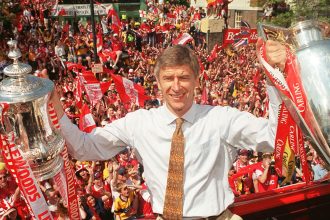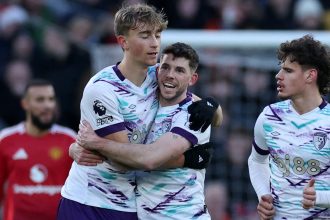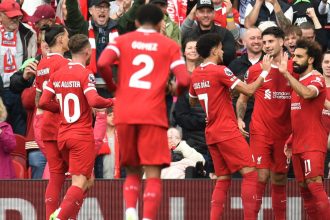The Brazilian midfielder brought flair and excitement to the Premier League during a dazzling three-year spell
'The Barclays'. While the Premier League was technically sponsored by the aforementioned bank between 2001-16, the period which is so wistfully looked back upon by fans of a certain vintage is the first decade of the 2000s.
After its initial emergence in 1992, the English top-flight enjoyed a secondary boom in popularity following the turn of the millennium, as overseas television deals and a secondary influx of foreign stars gave the league a truly global appeal. It played host to a number of the games modern icons, too, with Cristiano Ronaldo, Thierry Henry and Didier Drogba among those who lit up the Premier League on a weekly basis.
When fans refer to 'The Barclays', though, it is not those household names they are referring to. Instead, it is the players who were largely in the background when it came to being headline-grabbing, but were seen as key cogs in the Premier League machine by die-hard fans, while still able to produce moments of magic.
These players have come to be known as the 'Barclaysmen', but what made them so beloved, and what became of them once their Barclays life was over? Here at GOAL, we will endeavour to find out with our latest series, 'Ultimate Barclaysmen'.
As the Barclaysmen trend swept social media recently, Hull City joined in by paying tribute to a Brazilian icon whose flair, unpredictability and collection of unforgettable goals left a lasting impression, despite his brief stay in England. To celebrate the one and only Geovanni, the Tigers chose Razorlight's 2004 hit single 'Golden Touch' to accompany a collection of his finest moments in east Yorkshire – a fitting anthem for a true Barclaysman.
AFPWhere he came from
Geovanni is the rare Barclaysman who didn't arrive in the Premier League as a complete unknown. By the time Barcelona brought him to Catalonia at the age of 21, he was already a full Brazil international and commanded a £17.6 million ($23m) fee to convince Cruzeiro to let him leave.
The bright lights of the Camp Nou were impossible to resist, but Geovanni struggled to break into a team that featured Ballon d'Or winner Rivaldo, and he left the club after just two years.
Benfica offered him an environment to continue refining his skills away from the spotlight, and he delivered several standout moments during his time in Portugal. In 2006, Geovanni returned to Cruzeiro to be closer to family and friends, but it was only a matter of time before European football called again.
That call came in 2007, when Manchester City made him a Premier League player. City were entering a new era under Thaksin Shinawatra's ownership, and Geovanni became the third signing in a summer that also saw the arrivals of compatriot Elano, Martin Petrov, Rolando Bianchi and Benjani. City nearly missed out on him – Portsmouth invited him for a trial but didn't offer him a contract – and within weeks of arriving, Geovanni was showing off his talent with goals against West Ham and a memorable winner against Manchester United. He was up and running.
AdvertisementBarclays highlights
Scoring the winner in a Manchester derby will ensure Geovanni will never have to buy a pint in the east side of the city again. It was his first start in City blue, and he marked it by beating Edwin van der Sar from nearly 30 yards out in a 1-0 win. That was as good as it got for him, though – he didn't start another game for the club after December and was released at the end of the season.
Despite Geovanni's limited action at Man City, Hull City had seen enough to sign him as Phil Brown and his superiors attempted to put together a team that could survive in the Premier League. The 2008-09 season was the Tigers' first in the top flight of English football in their entire history, and they needed some magic in order to stay up. Cue Geovanni.
Twenty-two minutes into his debut was all it took for him to write his name into Hull history. He scored the club's first ever goal in the highest division by curling a beautiful effort beyond Mark Schwarzer, and Hull would go on to win the match 2-1.
That goal will never be forgotten by Hull supporters, but a wider audience will recall his stunning effort in that extraordinary win over Arsenal at Emirates Stadium. Only a few players would have dared to even think of shooting from Geovanni's position, but not everyone possesses the same ability to conjure moments of sheer brilliance. "The goal of a lifetime," Arsenal boss Arsene Wenger called it, and he followed it up by scoring a free-kick in a 1-0 win at Tottenham a week later. Hull had a new star.
AFP'He is a sunshine boy'
Hull weren't entirely sure what to expect when they signed Geovanni. He hadn't lasted long at Barcelona or Man City, and Benfica terminated his contract just six months after he'd scored a goal that knocked Manchester United out of the Champions League. This caused then-manager Brown some concern, even after his inspired start to life at the club.
"With the sun on his back, he is a very good player," Brown said after the Spurs win. "It is only when it's blowing a gale, when we are at the worst ground in the Premier League, and it is wet, that I can answer that question. When the weather changes and the clever, beautiful game has become a harder working environment, then, hopefully, I will have the same answer."
By the end of that 2008-09 season, Brown could have no complaints. Geovanni top-scored with eight Premier League goals as Hull stayed in the top flight by the slimmest of margins. Those same heroics couldn't be repeated the following year as Hull were relegated back to the Championship, but Brown was left with fond memories of his time with the Brazilian.
"He was an inspired signing," Brown told The Athletic in 2023. "When I found out we were getting him, I nearly jumped out of my skin with excitement. His individual brilliance helped us break down defences."
Getty Images SportMoving on
Hull and Geovanni's Premier League fairytale came to an end in 2009-10 as they finished 19th, winning just one of their final 13 games. The inconsistency that plagued Geovanni's performances at Benfica began to creep in – his sending off against fellow survival hopefuls Burnley in October 2009 wasn't the sort of output Brown needed from his talisman, who didn't score a league goal from November onwards. But Geovanni had already left a lasting impact at Hull, and the club had left its mark on him. "Just speaking about the club makes me emotional," he said in an interview with . "It was a dream for me. Those may have been the best days of my life as a footballer."
Relegation forced the Tigers into selling their highest earners in order to balance the books, and Geovanni saw his contract terminated a year ahead of its expiration. He said he would "love" to go back one day, and there's no doubt he would be welcome with open arms. "I felt the love the fans had for me," he added. "They chanted my name non-stop. It was a special time."






